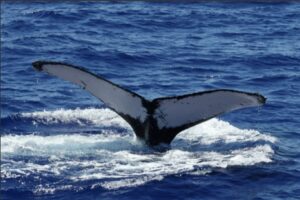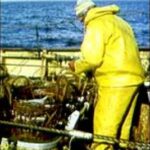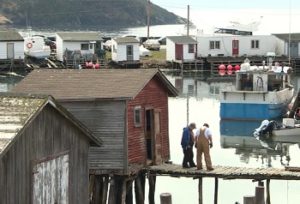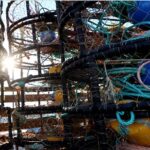Tag Archives: Atlantic States Marine Fisheries Commission
Mandated elver catch reduction to be discussed Jan. 2 in Brewer, Me
 The purpose of the meeting is for Maine Department of Marine Resources officials to talk to elver fishermen and dealers about landings reductions that have been mandated by the Atlantic States Marine Fisheries Commission. The commission has told Maine that it must reduce its 2014 elver landings total by 25 to 40 percent from the 2013 harvest total. Read more@bdn 18:07
The purpose of the meeting is for Maine Department of Marine Resources officials to talk to elver fishermen and dealers about landings reductions that have been mandated by the Atlantic States Marine Fisheries Commission. The commission has told Maine that it must reduce its 2014 elver landings total by 25 to 40 percent from the 2013 harvest total. Read more@bdn 18:07
Northern Shrimp: first casualty of New England warming water? – Tragically, the answer is maybe
 The Gulf of Maine is the southernmost extent of the range for this cold water species and the water in the Gulf has been getting warmer since the 1960s (see graph). Shrimp require specific water temperature and chemistry during spawning and for larval shrimp survival. In the past, shrimp success has been lower during warm water events in the Gulf of Maine. It is possible that the warming trend in the Gulf of Maine is causing spawning events to not occur or to have very low survival rates for larval shrimp. Read more@workingwaterfront 08:36
The Gulf of Maine is the southernmost extent of the range for this cold water species and the water in the Gulf has been getting warmer since the 1960s (see graph). Shrimp require specific water temperature and chemistry during spawning and for larval shrimp survival. In the past, shrimp success has been lower during warm water events in the Gulf of Maine. It is possible that the warming trend in the Gulf of Maine is causing spawning events to not occur or to have very low survival rates for larval shrimp. Read more@workingwaterfront 08:36
Maine says it must curtail the elver harvest because of declining population, but fishermen say their livelihood is being interfered with.
 Industry officials supported quotas based on historical catch during the first public hearing hosted by state regulators this week in Augusta. Another hearing will be held Jan. 2 in Brewer. “We’re being led down the road by bad science. It’s a data-poor species, so the scientists would rather err on the side of caution. That’s because they get paid and we don’t. They get a check every week. We only get paid if we catch something,” said Jeffrey Pierce, executive director of the Maine Elver Fishermen’s Association. more@portlandpress 17:28
Industry officials supported quotas based on historical catch during the first public hearing hosted by state regulators this week in Augusta. Another hearing will be held Jan. 2 in Brewer. “We’re being led down the road by bad science. It’s a data-poor species, so the scientists would rather err on the side of caution. That’s because they get paid and we don’t. They get a check every week. We only get paid if we catch something,” said Jeffrey Pierce, executive director of the Maine Elver Fishermen’s Association. more@portlandpress 17:28
Maine Shrimp: “We are screwed,” – Warming ocean, absence of springtime plankton surge, predation by other species, and of course the “obligatory” overfishing
 An advisory council had recommended that the fishery remain open on a limited basis in 2014, from mid-February through March. Past seasons have run from December through May. Spencer Fuller, the shrimp product line manager for Cozy Harbor Seafood in Portland, said that recommendation was rejected by the commission, which represents Maine, New Hampshire and Massachusetts. He said the compromise would have kept the industry going and prevented its reputation from being damaged in world markets. “We felt the risk of any damage to the fishery based on that proposal would have been minimal,” Fuller said. “We certainly don’t agree with (the commission’s) Draconian approach.” more@portlandpress 17:50
An advisory council had recommended that the fishery remain open on a limited basis in 2014, from mid-February through March. Past seasons have run from December through May. Spencer Fuller, the shrimp product line manager for Cozy Harbor Seafood in Portland, said that recommendation was rejected by the commission, which represents Maine, New Hampshire and Massachusetts. He said the compromise would have kept the industry going and prevented its reputation from being damaged in world markets. “We felt the risk of any damage to the fishery based on that proposal would have been minimal,” Fuller said. “We certainly don’t agree with (the commission’s) Draconian approach.” more@portlandpress 17:50
Atlantic States Marine Fisheries Commission Pulls the Plug on Gulf of Maine Shrimp Fishery
 “The Northern Shrimp Technical Committee has considered the Gulf of Maine northern shrimp stock to have collapsed with very little hope for recovery in the near future,” Kelly Whitmore, chairwoman of the committee, told members of a section advisory panel Tuesday morning. “There are no small shrimp around right now. It doesn’t bode well for the future.” more@BDN 16:34
“The Northern Shrimp Technical Committee has considered the Gulf of Maine northern shrimp stock to have collapsed with very little hope for recovery in the near future,” Kelly Whitmore, chairwoman of the committee, told members of a section advisory panel Tuesday morning. “There are no small shrimp around right now. It doesn’t bode well for the future.” more@BDN 16:34
Gulf of Maine Shrimp season may be a non-starter
In a report prepared last week, the Northern Shrimp Technical Committee of the Atlantic States Marine Fisheries Commission said it will recommend a total “moratorium on fishing in 2014 to maximize spawning potential” of the Gulf of Maine shrimp population. more@GDT![]() 09:55
09:55
Dr. Louis Daniel, Director of the North Carolina Division of Marine Fisheries new chairman of the Atlantic States Marine Fisheries Commission
 A 1995 graduate of the Ph.D. program in William & Mary’s School of Marine Science at VIMS, Daniel has served as an ASMFC Commissioner since 2007. Established in 1942, the Commission is a deliberative body of the Atlantic coastal states, coordinating the conservation and management of 25 near-shore fish species from Florida to Maine. Daniel replaces Paul J. Diodati of Massachusetts. more@vims,edu 15:33
A 1995 graduate of the Ph.D. program in William & Mary’s School of Marine Science at VIMS, Daniel has served as an ASMFC Commissioner since 2007. Established in 1942, the Commission is a deliberative body of the Atlantic coastal states, coordinating the conservation and management of 25 near-shore fish species from Florida to Maine. Daniel replaces Paul J. Diodati of Massachusetts. more@vims,edu 15:33
Changes loom for Maine elver fishery – catch limits – swipe-card monitoring of elver sales – welfare fraud prevention project
 Maine’s lucrative elver fishery is facing some big changes, including smaller catch quotas and a new swipe-card monitoring system that state officials hope will help manage the resource while reducing the poaching of baby eels that fetched up to $2,000 a pound last season. more@portlandpress 12:08
Maine’s lucrative elver fishery is facing some big changes, including smaller catch quotas and a new swipe-card monitoring system that state officials hope will help manage the resource while reducing the poaching of baby eels that fetched up to $2,000 a pound last season. more@portlandpress 12:08
Rules on striped bass fishing could become tougher
 The Atlantic States Marine Fisheries Commission announced last week that the female spawning stock biomass for Atlantic striped bass has continued to decline since 2004 and is estimated at 128 million pounds, about 31 million pounds below the target, although overfishing is not to blame. [email protected] 19:39
The Atlantic States Marine Fisheries Commission announced last week that the female spawning stock biomass for Atlantic striped bass has continued to decline since 2004 and is estimated at 128 million pounds, about 31 million pounds below the target, although overfishing is not to blame. [email protected] 19:39
“I don’t know what we’ll find here,” Enigmatic eels a focus of concern
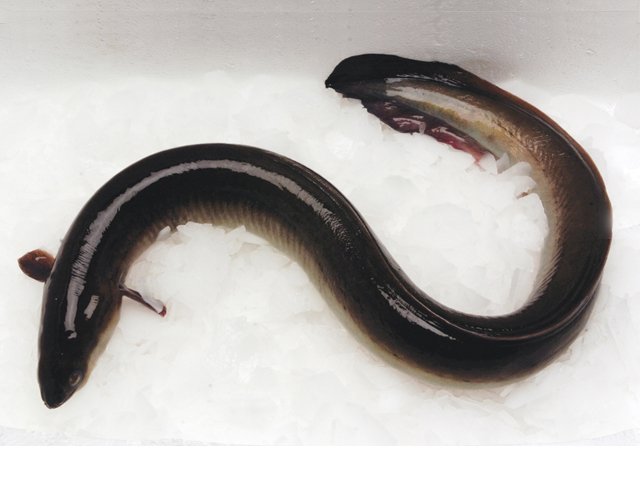 On a chilly morning when other watermen on the Patuxent River dredged for oysters, Jimmy Trossbach sought more slippery quarry — American eels. Last week, the Atlantic States Marine Fisheries Commission, which oversees near-shore fishing along the coast, put off a decision on catch limits until May while one state, Maine, works to slash its commercial harvest of young “glass” eels. more@baltimoresun 08:08
On a chilly morning when other watermen on the Patuxent River dredged for oysters, Jimmy Trossbach sought more slippery quarry — American eels. Last week, the Atlantic States Marine Fisheries Commission, which oversees near-shore fishing along the coast, put off a decision on catch limits until May while one state, Maine, works to slash its commercial harvest of young “glass” eels. more@baltimoresun 08:08
Atlantic States Marine Fisheries Commission: Atlantic Striped Bass not overfished or experiencing overfishing
 That’s right! After this week’s meeting we’re pleased to announce that the recent benchmark assessment indicates that the Atlantic Striped Bass resource is not overfished or experiencing overfishing relative to proposed new reference points defined in the assessment. [email protected] 12:14
That’s right! After this week’s meeting we’re pleased to announce that the recent benchmark assessment indicates that the Atlantic Striped Bass resource is not overfished or experiencing overfishing relative to proposed new reference points defined in the assessment. [email protected] 12:14
UPDATED: Maine’s elver-fishing industry could be affected by new regulations – harvest to be cut by 25% in 2014
 The American Eel Management Board of the Atlantic States Marine Fisheries Commission is meeting Wednesday in Georgia to discuss and possibly vote on new regulations. Options range from maintaining the status quo to imposing quotas to closing the fishery. more@kennebecjournal 12:12 new info here
The American Eel Management Board of the Atlantic States Marine Fisheries Commission is meeting Wednesday in Georgia to discuss and possibly vote on new regulations. Options range from maintaining the status quo to imposing quotas to closing the fishery. more@kennebecjournal 12:12 new info here
Maryland Department of Natural Resources responds to watermen lawsuit
The Maryland Departm![]() ent of Natural Resources has responded to a lawsuit filed against it on Oct. 18, alleging that menhaden limits were set illegally after not following proper implementation procedure. [email protected]
ent of Natural Resources has responded to a lawsuit filed against it on Oct. 18, alleging that menhaden limits were set illegally after not following proper implementation procedure. [email protected]
Atlantic States Marine Fisheries Commission – fishermen disagree on shrimp stocks
There is, it seems, more bad news coming out of the ocean than fish. In yet another blow to local commercial fishermen who work the Gulf of Maine winter shrimp season, it appears the 2013-14 shrimping season may be even more dismal than last year’s abbreviated and paltry campaign. more@GDT 02:13
Atlantic States Marine Fisheries Commission Roll’s Out New Wesite!
 Check it out. Eye appealing and functional. http://www.asmfc.org/ 14:52
Check it out. Eye appealing and functional. http://www.asmfc.org/ 14:52
Locals reflect on dying industry as Sound closes to fall lobster harvesting
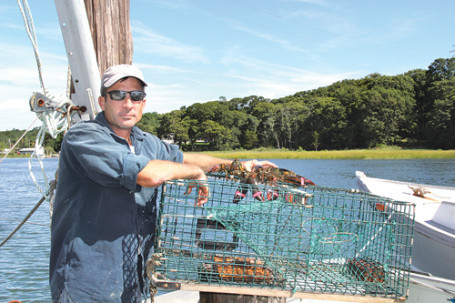 A third-generation lobsterman, Matt DeMaula has patrolled Long Island Sound alongside his father and uncles for more than two decades. When he thinks back to his early days in the profession, the Mattituck native can recall some remarkable fall seasons. A combination of rising water temperatures, low dissolved oxygen, pesticide runoff and nitrogen loading proved too much for the crustaceans, causing an extreme die-off in 1999, said Emerson Hasbrouck, senior marine environmental issues educator at Cornell Cooperative Extension of Suffolk County. more@thesuffolktimes 10:47
A third-generation lobsterman, Matt DeMaula has patrolled Long Island Sound alongside his father and uncles for more than two decades. When he thinks back to his early days in the profession, the Mattituck native can recall some remarkable fall seasons. A combination of rising water temperatures, low dissolved oxygen, pesticide runoff and nitrogen loading proved too much for the crustaceans, causing an extreme die-off in 1999, said Emerson Hasbrouck, senior marine environmental issues educator at Cornell Cooperative Extension of Suffolk County. more@thesuffolktimes 10:47
Atlantic States Marine Fisheries Commission sinks Connecticut lobster industry

“We have been beaten to death around the clock,” said Frate at his seafood store on Darien’s Post Road last week. Since the die-off that began in September 1999 when lobstermen in the western Sound started pulling dead and dying lobsters up in their traps, Frate says the state’s lobstermen have been subjected to a series of gauge increases — continually increasing the size of legal lobsters — and gate size increases on the traps which have allowed bigger and bigger lobsters to escape capture. more@newstimes 09:37
Connecticut: Crustaceous canary? Prevailing lack of confidence that this sacrifice will do much of anything
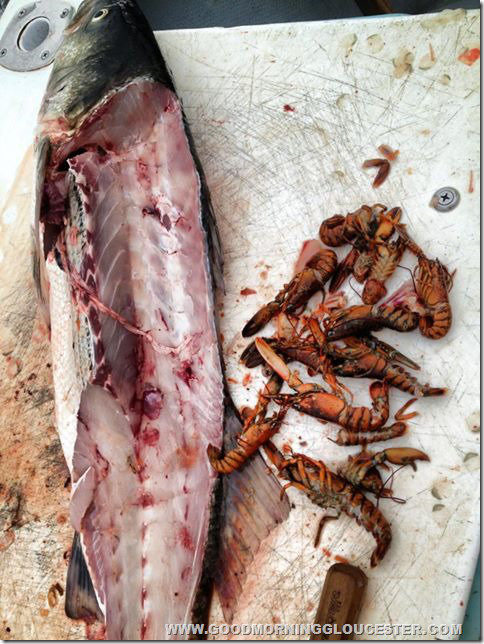 The state’s lobstermen seem to be stoically and inexorably accepting the first-ever ban on lobster gathering in Long Island Sound. What is most distressing, however, is the prevailing lack of confidence that this sacrifice will do much of anything to restore the struggling fishery.,, A third theory is that lobsters are suffering because other species are flourishing. Striped bass, scup and other predatory fish like to make a meal of young lobsters. more@theday 07:43
The state’s lobstermen seem to be stoically and inexorably accepting the first-ever ban on lobster gathering in Long Island Sound. What is most distressing, however, is the prevailing lack of confidence that this sacrifice will do much of anything to restore the struggling fishery.,, A third theory is that lobsters are suffering because other species are flourishing. Striped bass, scup and other predatory fish like to make a meal of young lobsters. more@theday 07:43
Maine fisheries scientist Maggie Hunter is honored for her work

PORTLAND — A fisheries scientist from Maine has been recognized by the Atlantic States Marine Fisheries Commission for her years of contributions to fisheries science and management. more@portlandpressherald
UPDATED: Regulators delay decision on quotas for baby eels – elver fishermen will have to wait six more months
Maine’s elver fishermen will have to wait six more months or more to find out whether regulators will impose quotas or other restrictions on the highly profitable industry for baby eels. @morningsentinal
Atlantic States Marine Fisheries Commission considering quotas for Maine eels
Regulators from East Coast states are considering possible new regulations that could place an annual quota on Maine’s lucrative eel fishery. @kennebecjournal
The debate over catch limits and quotas for elvers in Maine and other Atlantic states
 The board of the Atlantic States Marine Fisheries Commission will meet Wednesday in Virginia to decide whether to move ahead on its working group’s recommendations or incorporate details not included in the most recent management plan. At stake is a fishery that’s worth tens of millions of dollars a year in Maine alone, with baby eels often selling for $2,000 a pound or more. @kennebecjournal
The board of the Atlantic States Marine Fisheries Commission will meet Wednesday in Virginia to decide whether to move ahead on its working group’s recommendations or incorporate details not included in the most recent management plan. At stake is a fishery that’s worth tens of millions of dollars a year in Maine alone, with baby eels often selling for $2,000 a pound or more. @kennebecjournal
NYS Assembly kills bill extending striped bass season – would have ensured that quotas can be reached even if affected by natural causes.”
Bonnie Brady, executive director of the Long Island Commercial Fishing Association, said the bill would have helped fishermen meet their quotas, even if stormy weather or other conditions prevented them from getting out to fish. The regulations were put in place to protect the bass when their population plummeted in the 1980s. Now the stock has been rebuilt, Ms. Brady said. “It’d be nice if the regulations would come into the 21st century like the fishermen have,” she said. continued@shelterislandreporter
Hammerhead shark protection debated – National Marine Fisheries Service pushed by WildEarth Guardians and the Natural Resources Defense Council.
 A proposal to protect the great hammerhead shark has sparked a debate over whether federal protection is necessary to conserve a majestic ocean predator or whether this would just impose an unnecessary burden on the fishing industry. continued@sunsentinal
A proposal to protect the great hammerhead shark has sparked a debate over whether federal protection is necessary to conserve a majestic ocean predator or whether this would just impose an unnecessary burden on the fishing industry. continued@sunsentinal
Atlantic Coastal Fisheries Cooperative Management Act Provisions; American Lobster Fishery – Proposed Rule; Request For Comments.
American Lobster Fishery; Fishing Effort Control Measures To Complement Interstate Lobster Management Recommendations by the Atlantic States Marine Fisheries Commission. NMFS proposes new Federal American lobster regulat ions that would control lobster trap fishing effort by limiting access into the lobster trap fishery in Lobster Conservation Management Area 2 (Federal nearshore waters in Southern New England; Area 2), and in the Outer Cape Cod Lobster Conservation Management Area (Federal nearshore waters east of Cape Cod, MA; Outer Cape Area). continued@federal register
ions that would control lobster trap fishing effort by limiting access into the lobster trap fishery in Lobster Conservation Management Area 2 (Federal nearshore waters in Southern New England; Area 2), and in the Outer Cape Cod Lobster Conservation Management Area (Federal nearshore waters east of Cape Cod, MA; Outer Cape Area). continued@federal register
Proposed Measures to Limit Lobster Trap Fishing Effort in Federal Waters — DEADLINE FOR PUBLIC COMMENTS IS JULY 29
At the request of the Atlantic States Marine Fisheries Commission, which has the lead for American lobster management, NOAA Fisheries NMFS today announced proposed measures to control trap fishing effort in Area 2 (Federal inshore waters–Southern New England) and the Outer Cape Area (Federal inshore waters east of Cape Cod, Massachusetts) and to provide a way for lobster fishermen to scale their businesses to optimum efficiency through the purchase and sale of lobster trap allocations. Click here for more information. To view the federal register notice, click here and then on tab that says June.
State Senate acts to protect bunker fishing in New Jersey
pressofAtlanticCity.com – New Jersey menhaden fishermen already face a big cut in catches this year, but the state Senate on Monday adopted legislation that would at least prevent boats from other states from poaching the Garden State’s quota. continued
Saving Mehaden.org Analysis – Wild Ocean article “Menhaden Science Supports Conservation,”
Early in 2013, the Atlantic States Marine Fisheries Commission’s (ASMFC) Menhaden Technical Committee determined that there is too much uncertainty![]() in the most recent stock assessment results to determine whether or not menhaden are currently overfished. Despite this development, Ken Hinman, in his Wild Ocean article “Menhaden Science Supports Conservation,” asserts that continued
in the most recent stock assessment results to determine whether or not menhaden are currently overfished. Despite this development, Ken Hinman, in his Wild Ocean article “Menhaden Science Supports Conservation,” asserts that continued
Seven major Commercial Fisheries cleared by NOAA of harming or posing a threat to the iconic sturgeon
 fishnewsseu.com – A DRAFT Biological Opinion released by US National Oceanic and Atmospheric Administration (NOAA) today, found that seven existing commercial fisheries in New Jersey pose “no jeopardy” for Atlantic sturgeon. This determination, formalised by a Section 7 Consultation required under the federal Endangered Species Act (ESA), applies to the northeast multispecies, monkfish, spiny dogfish, Atlantic bluefish, northeast skate, squid/mackerel/butterfish, and summer flounder/scup/black sea bass fisheries. continued
fishnewsseu.com – A DRAFT Biological Opinion released by US National Oceanic and Atmospheric Administration (NOAA) today, found that seven existing commercial fisheries in New Jersey pose “no jeopardy” for Atlantic sturgeon. This determination, formalised by a Section 7 Consultation required under the federal Endangered Species Act (ESA), applies to the northeast multispecies, monkfish, spiny dogfish, Atlantic bluefish, northeast skate, squid/mackerel/butterfish, and summer flounder/scup/black sea bass fisheries. continued
Maine’s elver industry could be shut down in August
![]() ALEXANDRIA, Va. – An interstate fisheries commission postponed a decision Tuesday on whether to scale back or even shut down the highly profitable baby eel fishery in Maine and South Carolina after members decided they needed more time to weigh options. continued
ALEXANDRIA, Va. – An interstate fisheries commission postponed a decision Tuesday on whether to scale back or even shut down the highly profitable baby eel fishery in Maine and South Carolina after members decided they needed more time to weigh options. continued
New Jersey has chance to use other states’ unused flounder quotas



































